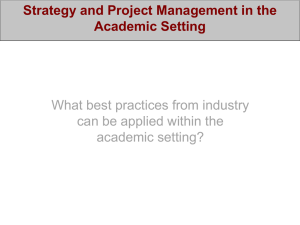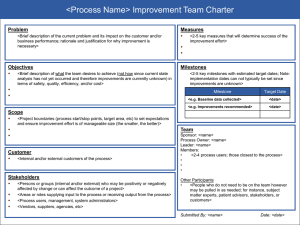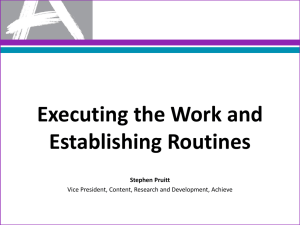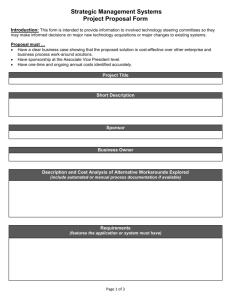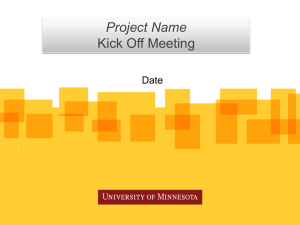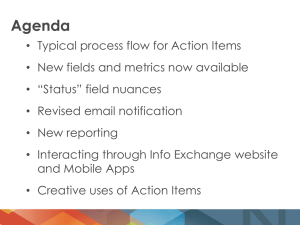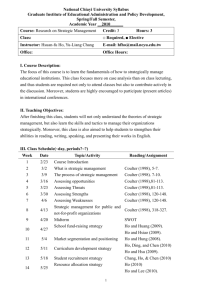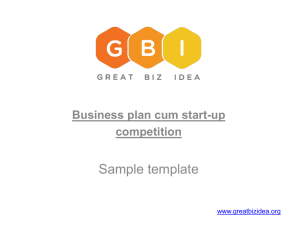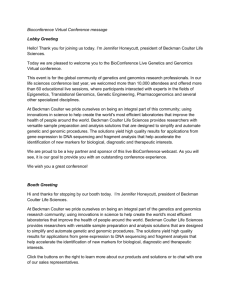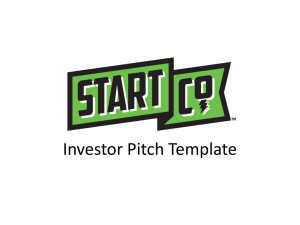Strategy and Project Management in the Academic Setting
advertisement
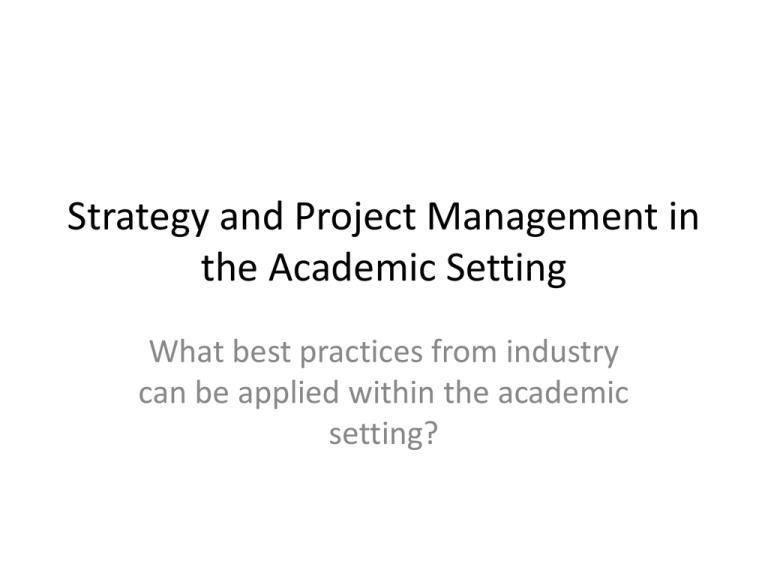
Strategy and Project Management in the Academic Setting What best practices from industry can be applied within the academic setting? Industry and Academia Have Differing Goals and Metrics of Success • Industry focuses on translation and products scientists pursue tangible entities (validated targets, novel molecules, biomarker assays) • Measure of success : $$$ • Academia focus basic research knowledge creation though basic research and dissemination of knowledge • Measure of success : Tenure Principles of effectiveness in managing project progression apply equally in both settings – project advancement is fundamental to both Science is a Team Sport in Industry • Many disciplines and functions are need to move projects forward (eg. Chemists, biologists, toxicologist, pharmacologists, engineers, manufacturers, lawyers, marketers) • Highly effective use of multiple resources serves the purpose of translation • In contrast there are incentives (getting tenure) for academics to lean towards individual research in order to substantiate significant impact A Multidisciplinary Approach Can Be Dilutive to Your Perceived Impact Consider how to bring additional expertise to your project (collaborators, consultants, contractors) especially If you are translationally-oriented Principles of Project Management Phases of Project Management Cornerstones of Effective Project Management Initiation Milestone-based Planning Execution Accountability Monitoring Closing Managing Risk Initiation & Planning of Projects • Assemble team (think about external experts!) • Identify goals, establish milestones/aims • Create a project plan (simple or detailed) – Specific project activities & tasks – Timing of activities – Interdependencies among work streams – Cost – Important milestones Detailed Project Plan and Timeline: Microscoft Gantt Chart is an Industry Standard Simplified Project Plan and Timeline Modeled After Gantt Chart (NIH) High Level Project Plan and Timeline Prototype Pacemaker Design and Manufacture Rabbit implant technique piloted Build device with internal charging coil (Coulter) Electrical output tested 8 HUD Designation Obtained Fetal sheep model study with optimized device (without recharging) (Coulter) Go/ No Go Quality System Development Reports Funding Coulter Project Activities <Q2 12 NIH R01 Application + oral Q3 12 Q4 12 Q1 13 + oral Q2 13 Design and fabrication of external recharging system (CTSI Funding) Q1 14 Fetal sheep studies incorporating external recharging system (R01) Publication AHA Meeting Patents Prosecuted in US and Canada & new IP under review Q4 13 Press Release conversion Accountability • Regularly scheduled team meetings • Create agendas for team meetings and follow them • Team meeting minutes with ACTION ITEMS assigned to team members • Review ACTION ITEMS at next team meeting to ensure they have been completed • Careful tracking of documentation/data Managing Risks • Identify risks and have some form of mitigation for these risks • Supplement your team with complementary skill sets • Formulate endpoints and pivot if necessary Build optionality into your project plans and make adjustments to your research direction as you build your information base Some Important Issues for Academic Laboratories You Need to Think About • Research data retention • Research data organization and storage • Industry utilizes electronic laboratory notebooks and has extensive infrastructure to support capturing work product, data, and inventions Problem: data walking out the door Solution: centralized data management Data Management Tools Central Desktop • Electronic Filing System for Documents & Data • Functionality for Tracking Project Plans & Timelines • Reporting and Monitoring • A Collaboration Tool Central Desktop Dashboard Best Practices from Industry that Can Be Leveraged by Academia in Managing Your Projects Defined milestones Defined project needs / resources Mapping of timelines Team building with complementary team skills Data management and storage Principles of effectiveness in managing project progression should apply equally in both settings – project advancement is fundamental to both
